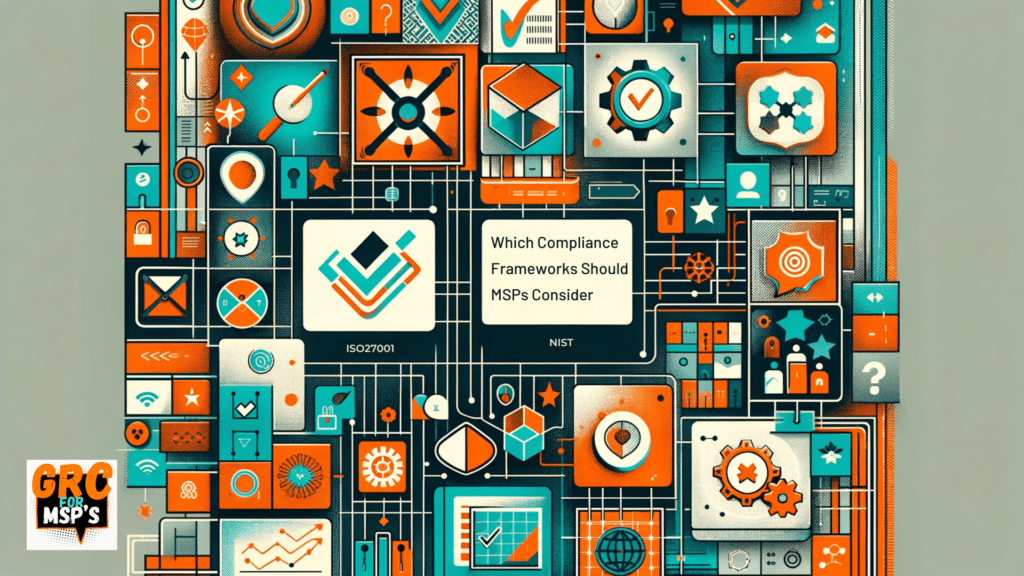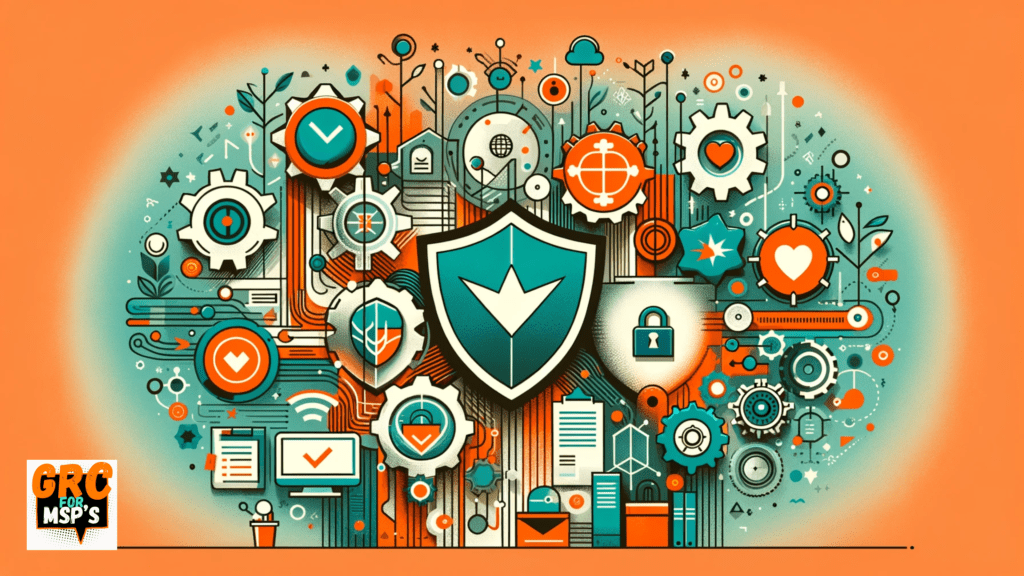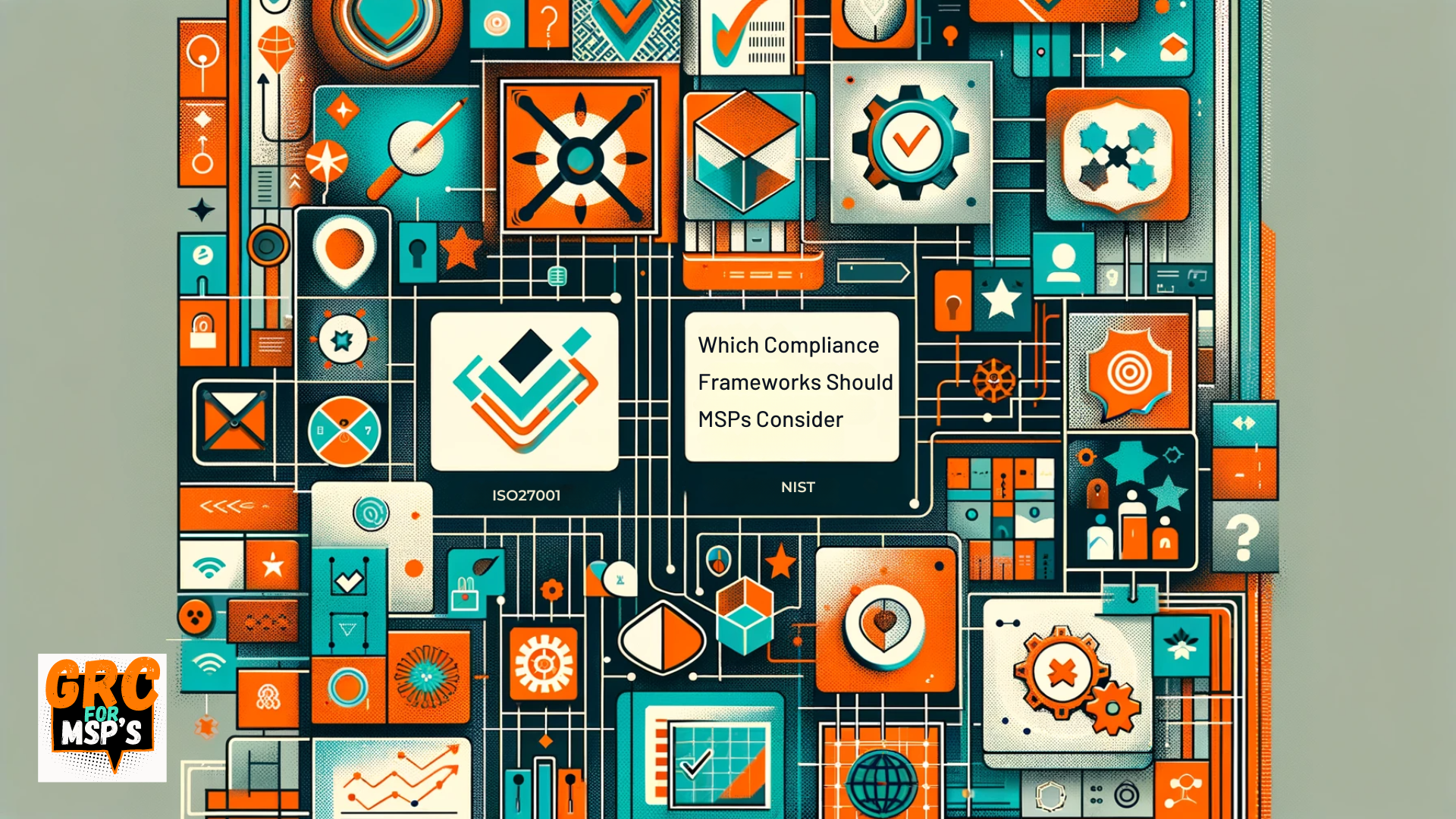Managed Service Providers (MSPs) play a crucial role in the cybersecurity landscape, offering vital services such as network management, data storage, and security solutions to businesses of various sizes. With the ever-evolving nature of cyber threats, MSPs must ensure they adhere to robust compliance frameworks to protect their clients and themselves. These frameworks not only establish a baseline for security measures but also demonstrate a commitment to best practices in cybersecurity, which is essential for gaining and maintaining trust.

Among the most recognised frameworks are ISO 27001, the NIST Cybersecurity Framework (CSF), the Essential Eight from the Australian Cyber Security Centre, the Cybersecurity Maturity Model Certification (CMMC), Cyber Essentials in the UK, and the General Data Protection Regulation (GDPR) in the European Union. Each framework serves a unique purpose, ranging from providing a comprehensive set of security controls to meet international standards, to offering guidance on protecting personal data.
Key Takeaways
- MSPs must conform to compliance frameworks to reinforce cybersecurity and build trust with clients.
- Various frameworks provide tailored guidance and controls to meet cybersecurity needs across different regions and industries.
- Adherence to these frameworks is central to managing cybersecurity risks and ensuring the continuity of business operations.
Understanding Compliance and the Role of MSPs
Compliance frameworks serve as the backbone for trustworthiness and security in the digital realm. Enterprises depend on Managed Service Providers (MSPs) to protect sensitive information through adherence to these critical standards.
Defining Compliance and Its Importance
Compliance refers to the adherence to laws, regulations, guidelines, and specifications relevant to business operations. For MSPs, this involves a strict set of practices that aim to safeguard customer data and ensure privacy. Two pivotal concepts underpin compliance:
- Trust: Customers rely on MSPs to manage and protect their information. Following established compliance frameworks builds trust and demonstrates reliability.
- Protection: Compliance is about protecting data from threats and breaches, which in turn upholds the trust placed by clients in their service providers.
The Responsibilities of Managed Service Providers
MSPs shoulder significant responsibilities to ensure that they meet compliance standards:
- Assessment and Implementation: They must assess the current level of compliance and implement measures to satisfy various standards, such as ISO 27001, NIST CSF, and the GDPR.
- Continuous Monitoring: There is a need for ongoing surveillance to guard against new threats.
- Education and Training: Employees are often trained to understand compliance requirements, enabling them to manage risks effectively.
It is clear that MSPs act as stewards of compliance, working to establish and maintain a secure environment for the information they are tasked to manage.
Overview of Key Compliance Frameworks

Managed Service Providers (MSPs) need to align their operations with various compliance frameworks to protect their clients’ data and maintain a robust security posture. From international standards to region-specific regulations, these frameworks define the controls and practices required to manage and secure information systems and networks against cyber threats.
ISO 27001: International Standards for Information Security
ISO 27001 is a widely-recognised framework that outlines the requirements for an information security management system (ISMS). It encompasses a set of policies, procedures, and controls focused on managing risks to information security. Adherence to ISO 27001 helps organisations protect their information assets systematically and cost-effectively.
NIST CSF: The US National Framework for Improved Cybersecurity
The NIST Cybersecurity Framework (CSF) provides a policy framework of computer security guidance for how private sector organisations in the United States can assess and improve their ability to prevent, detect, and respond to cyber attacks. It uses a set of industry standards and best practices to help organisations manage cybersecurity risks.
Essential 8: Cybersecurity Strategies from the Australian Cyber Security Centre (ACSC)
Developed by the Australian Cyber Security Centre, the Essential 8 is a set of strategies organisations can implement to improve their cybersecurity resilience. These strategies are designed to mitigate the most common cyber threats and enhance the security of sensitive information and systems.
CMMC: Cybersecurity Maturity Model Certification
The Cybersecurity Maturity Model Certification (CMMC) combines various cybersecurity standards and best practices to ensure that defence contractors in the United States can safeguard sensitive defence information. The CMMC framework assesses and enhances the contractors’ networks and information technology systems’ security posture.
Cyber Essentials: UK’s Cybersecurity Baseline
Cyber Essentials is a government-backed, industry-supported scheme to help organisations protect themselves against common online threats. It’s a simple but effective framework that provides a strong baseline of cybersecurity suitable for all organisations in the UK.
General Data Protection Regulation (GDPR): Data Privacy and Security for Europe
The General Data Protection Regulation (GDPR) is a legal framework that sets guidelines for the collection and processing of personal information from individuals in the European Union (EU). It is designed to harmonise data privacy laws across Europe and to give better control to EU residents over their personal data.
Assessing and Implementing Compliance Frameworks
When Managed Service Providers (MSPs) approach compliance, the epitome of their effort lies in a thorough understanding and application of relevant frameworks. These frameworks guide MSPs in implementing robust security measures, managing risks effectively, and adhering to regulatory standards to safeguard their operations and their clients’ data.
The Process of Risk Assessment and Management
Risk assessment and management are at the core of most compliance frameworks such as ISO27001 and the NIST Cybersecurity Framework. They require organisations to identify potential risks to information security and establish appropriate controls to mitigate them. This process entails:
- Identifying assets: Classifying information and related assets prime for protection.
- Risk analysis: Evaluating the vulnerabilities and threats these assets face.
- Risk evaluation: Determining the potential impact of the risks identified.
For MSPs, this systematic approach must be documented and continually updated, reflecting a changing risk landscape.
Framework Implementation and the Path to Certification
Following a comprehensive risk assessment, MSPs move toward framework implementation. This involves:
- Developing policies and procedures: Tailoring them to meet framework requirements such as CMMC and Cyber Essentials.
- Training staff: Ensuring they understand and are capable of implementing these policies.
- Applying technical controls: Such as those outlined in frameworks like Essential 8.
Certification is usually the subsequent step, demanding a review from an independent auditor to affirm compliance.
Best Practices for Maintaining Compliance
To guarantee enduring compliance, MSPs must foster a culture of continuous improvement. This involves:
- Regularly reviewing and updating policies: Considering emerging risks and technological advancements.
- Engaging in frequent training: To reinforce best practices amongst employees.
- Documenting evidence of compliance: Which is essential for audits and demonstrating diligence to clients.
MSPs that integrate these practices into their daily operations can not only maintain compliance but also reinforce their commitment to security excellence.
The Impact of Compliance on Security and Business Operations
Compliance frameworks are integral to bolstering a Managed Service Provider’s (MSP) security posture and enhancing trust with clients. They also serve as a differentiator in a competitive market.

Enhancing Security Posture Through Compliance
Compliance frameworks such as ISO27001, NIST CSF, and the Essential 8 provide MSPs with a robust set of security measures and policies to protect their clients’ data and network. By adhering to these frameworks, MSPs ensure a thorough security posture that encompasses asset management, access control, and consistent security reviews. This focus on security helps to fortify an MSP’s information systems against cyber threats.
The Intersection of Compliance and Organisational Trust
Trust between MSPs and their clients hinges on the reliability and security of the services provided. Compliance with standards like GDPR and Cyber Essentials acts as a testament to the MSP’s commitment to data protection and security policies. It demonstrates due diligence in safeguarding information assets, which is crucial for maintaining a favourable reputation and the trust of stakeholders.
Leveraging Compliance for Competitive Advantage
In an environment where business operations are continuously scrutinised for security effectiveness, MSPs that are compliant with frameworks like CMMC and ISO27001 distinguish themselves. They leverage compliance not only to meet mandatory regulations but also to gain a competitive edge. Organisations prefer MSPs who can prove their security posture is top-notch, providing them with a peace of mind that their sensitive data are well-protected.
Special Considerations for Different Industries and Data Types
Choosing the right compliance framework is paramount for Managed Service Providers (MSPs) operating across various industries, especially when considering the unique challenges each sector faces concerning data protection and cyber threats.
Adapting Frameworks for Healthcare and Financial Services
In healthcare, compliance frameworks need to align with industry best practices while addressing potential risks inherent in managing sensitive health data. The ISO/IEC 27001 is imperative for its risk-based and dynamic approach to data security. It provides a comprehensive set of controls for securing health information. Similarly, for financial services, the Essential 8 framework, developed by the Australian Signals Directorate, offers strategies to mitigate cyber incidents effectively, including sophisticated ransomware attacks that exploit sector-specific vulnerabilities.
Compliance in the Face of Evolving Cyber Threats
Cyber threats continually evolve, and so must the strategies to combat them. The NIST Cybersecurity Framework (CSF) is a robust standard that helps industries maintain resilience against such threats. It does so by promoting the adoption of cybersecurity standards and practices proven effective against a wide spectrum of cyber threats. This framework is versatile and can be adapted to various Information and Communication Technology (ICT) systems within different industry sectors.
Protecting Sensitive Data Across Various ICT Systems
The protection of sensitive data across ICT platforms requires a multi-faceted approach. Frameworks like Cyber Essentials in the UK, and General Data Protection Regulation (GDPR) in the European Union, provide essential baselines for cybersecurity. They offer MSPs a structure to ensure that data, regardless of its nature, is secured against unauthorised access and other cyber risks. Additionally, the Cybersecurity Maturity Model Certification (CMMC) framework focuses not just on standardising cybersecurity practices but also on comprehensive certification to instil confidence in stakeholders about the MSP’s commitment to securing data.
Challenges and Resources for MSP Compliance

Managed Service Providers (MSPs) face a dynamic environment where adherence to compliance frameworks is vital. They must balance strategic resource allocation while staying abreast of evolving regulations and fostering security awareness within their teams.
Navigating the Complexities of Compliance Regulations
Compliance with regulations like ISO27001, the NIST Cybersecurity Framework (CSF), and the General Data Protection Regulation (GDPR) presents a multifaceted challenge for MSPs. They must maintain current knowledge of each framework’s requirements, which can be organisations and time-consuming. Constant regulatory updates necessitate a proactive approach to compliance management. Resources such as the Prey Project’s insights on IT regulations offer valuable perspectives on why becoming compliant is not just necessary, but beneficial for MSPs.
Resource Allocation for Effective Compliance Practices
Effective resource allocation is crucial for MSPs to ensure they meet compliance demands. Budgeting must account for tools needed to manage and monitor compliance, such as software for Governance, Risk Management, and Compliance (GRC). Beyond financial investment, human resources must be designated to implement and maintain compliance measures, which can sometimes strain existing capacities. The guidance outlined by ConnectWise on MSP cybersecurity challenges underscores the importance of pinpointing resource needs to mitigate cyber risks.
Training and Building a Culture of Security Awareness
Training individuals within an organisation is a vital resource for sustaining a culture of security awareness. Frequent and updated training programs are necessary to keep pace with the changing landscape of cybersecurity threats and compliance requirements. Aside from formal education, resources like the MSP Knowledge Base provide actionable strategies for MSPs to address compliance complexity, equipping them with the knowledge to navigate industry-specific challenges.
Through a blend of timely regulation tracking, strategic investment in compliance tools, and ongoing staff education, MSPs can confidently address the hurdles of compliance. Accessing the right resources and employing a structured approach allows MSPs to protect their interests and those of their clients.
Frequently Asked Questions
This section addresses common queries regarding compliance frameworks for Managed Service Providers (MSPs).
What distinguishes ISO 27001 from the NIST Cybersecurity Framework?
ISO 27001 is a comprehensive international standard for information security management requiring a systematic approach to managing sensitive information, while the NIST Cybersecurity Framework provides guidelines focussed on improving cybersecurity across industries, offering flexibility in its implementation.
Can you articulate how Essential 8 and ISO 27001 differ in their approach to cyber security?
The Essential 8 is a set of strategies distilled to mitigate cyber incidents developed by the Australian Cyber Security Centre, focused on practical, specific defensive measures. In contrast, ISO 27001 emphasises continuous improvement through a broader Information Security Management System (ISMS).
In comparing NIST CSF to Essential 8, what are the key contrasts in their frameworks?
The NIST Cybersecurity Framework promotes a more holistic and customisable approach to securing information systems, adaptable to various sectors, while the Essential 8 takes a targeted, prescriptive stance on the most effective actions to prevent cybersecurity incidents.
Is it more beneficial for Managed Service Providers to implement CIS controls or adhere to the NIST framework?
Managed Service Providers might find CIS controls to offer a more granular set of security practices, whereas the NIST framework provides a high-level strategic view. The choice depends on the specific security needs and regulatory requirements faced by the MSP.
What compliance obligations do Australian businesses have under the Cyber Essentials scheme?
Cyber Essentials is a UK-based scheme, yet Australian businesses dealing with UK clients may find compliance necessary to demonstrate baseline cybersecurity posture, particularly when handling sensitive data.
How does the General Data Protection Regulation (GDPR) impact the operations and responsibilities of MSPs handling EU citizen data?
The General Data Protection Regulation (GDPR) imposes stringent data protection requirements, making MSPs responsible for ensuring clients’ data handling processes comply, regardless of where the MSP is based, if they process EU citizens’ personal data.

